- Home
- Patricia Cornwell
The Body Farm ks-5
The Body Farm ks-5 Read online
The Body Farm
( Kay Scarpetta - 5 )
Patricia Cornwell
Patricia Cornwell
The Body Farm
They that go down to the sea in ships, that do business in great waters; These see the works of the Lord, and his wonders in the deep.
Psalm 107:2324
1
On the sixteenth of October, shadowy deer crept to the edge of dark woods beyond my window as the sun peeked over the cover of the night.
Plumbing above and below me groaned, and one by one other rooms went bright as sharp tattoos from ranges I could not see riddled the dawn.
I had gone to sleep and gotten up to the sound of gunfire. It is a noise that never stops in Quantico, Virginia, where the FBI Academy is an island surrounded by Marines. Several days a month I stayed on the Academy's security floor, where no one could call me unless I wanted them to or follow me after too many beers in the Boardroom.
Unlike the Spartan dormitory rooms occupied by new agents and visiting police, in my suite were TV, kitchen, telephone, and a bathroom I did not have to share. Smoking and alcohol were not allowed, but I suspected that the spies and protected witnesses typically sequestered here obeyed the rules about as well as I did.
As coffee heated in the microwave, I opened my briefcase to retrieve a file that had been waiting for me when I had checked in last night. I had not reviewed it yet for I could not bring myself to wrap my mind around such a thing, to take such a thing to bed. In that way I had changed.
Since medical school, I had been accustomed to exposing myself to any trauma at any hour. I had worked around the clock in emergency rooms and performed autopsies alone in the morgue until dawn. Sleep had always been a brief export to some dark, vacant place I rarely later recalled. Then gradually over the years something perniciously shifted. I began to dread working late at night, and was prone to bad dreams when terrible images from my life popped up in the slot machine of my unconscious.
Emily Steiner was eleven, her dawning sexuality a blush on her slight body, when she wrote in her diary two Sundays before, on October 1:
Oh, I'm' so happy! Its almost 1 in the morning and Mom doesnt know I'm' writing in my diary because I'm' in bed with the flash light. We went to the cover dish supper at the church and Wren was there! I could tell he noticed me. Then he gave me a fireball! I saved it while he wasn't looking. Its in my secret box. This afternoon we have youth group and he wants me to meet him early and not tell anyone!
At three-thirty that afternoon, Emily left her house in Black Mountain, just east of Asheville, and began the two-mile walk to the church. After the meeting, other children recalled seeing her leave alone as the sun slipped below the foothills at six p. m. She veered off the main road, guitar case in hand, and took a shortcut around a small lake. Investigators believed it was during this walk she encountered the man who hours later would steal her life. Perhaps she stopped to talk to him. Perhaps she was unaware of his presence in the gathering shadows as she hurried home.
In Black Mountain, a western North Carolina town of seven thousand people, local police had worked very few homicides or sexual assaults of children.
They had never worked a case that was both. They had never thought about Temple Brooks Gault of Albany, Georgia, though his face smiled from Ten Most Wanted lists posted across the land.
Notorious criminals and their crimes had never been a concern in this picturesque part of the world known for Thomas Wolfe and Billy Graham.
I did not understand what would have drawn Gault there or to a frail child named Emily who was lonely for her father and a boy named Wren.
But when Gault had gone on his murderous spree in Richmond two years before, his choices had seemed just as devoid of rationality. In fact, they still did not make sense.
Leaving my suite, I passed through sun-filled glass corridors as memories of Gault's bloody career in Richmond seemed to darken the morning. Once he had been within my reach. I literally could have touched him, for a flicker, before he had fled through a window and was gone. I had not been armed on that occasion, and it was not my business to go around shooting people anyway. But I had not been able to shake the chill of doubt that had settled over my spirit back then.
I had not stopped wondering what more I could have done.
Wine has never known a good year at the Academy, and I regretted drinking several glasses of it in the Boardroom the night before. My morning run along J. Edgar Hoover Road was worse than usual. Oh, God, I thought. I'm not going to make it. Marines were setting up camouflage canvas chairs and telescopes on roadsides overlooking ranges. I felt bold male eyes as I slowly jogged past, and knew the gold Department of Justice crest on my navy T-shirt was duly noted.
The soldiers probably assumed I was a female agent or visiting cop, and it disturbed me to imagine my niece running this same route. I wished Lucy had picked another place to intern. Clearly, I had influenced her life, and very little frightened me quite as much as that did. It had become my habit to worry about her during workouts when I was in agony and aware of growing old.
HRT, the Bureau's Hostage Rescue Team, was out on maneuvers, helicopter blades dully batting air. A pickup truck hauling shot-up doors roared past, followed by another caravan of soldiers. Turning around, I began the one-and-a-half-mile stretch back to the Academy, which could have passed for a modern tan brick hotel were it not for its rooftops of antennas and location out in the middle of a wooded nowhere.
When at last I reached the guard booth, I veered around tire shredders and lifted my hand in a weary salute to the officer behind glass.
Breathless and sweating, I was contemplating walking the rest of the way in when I sensed a car slowing at my rear.
"You trying to commit suicide or something?" Captain Pete Marino said loudly across the Armor-Ailed front seat of his silver Crown Victoria.
Radio antennas bobbed like fishing rods, and despite countless lectures from me, he wasn't wearing his seat belt.
"There are easier ways than this," I said through his open passenger's window.
"Not fastening your seat belt, for example."
"Never know when I might have to bail out of my ride in a hurry."
"If you get in a wreck, you'll certainly bail out in a hurry," I said. "Probably through the windshield."
An experienced homicide detective in Richmond, where both of us were headquartered, Marino recently had been promoted and assigned to the First Precinct, the bloodiest section of the city. He had been involved with the FBI's Violent Criminal Apprehension Program, or VI CAP for years.
In his early fifties, he was a casualty of concentrated doses of tainted human nature, bad diet, and drink, his face etched by hardship and fringed with thinning gray hair. Marino was overweight, out of shape, and not known for a sweet disposition. I knew he was here for the Steiner consultation, but wondered about the luggage in his backseat.
"Are you staying for a while?" I asked.
"Benton signed me up for Street Survival."
"You and who else?" I asked, for the purpose of Street Survival was not to train individuals but task forces.
"Me and my precinct's entry team."
"Please don't tell me part of your new job description is kicking in doors."
"One of the pleasures of being promoted is finding your ass back in uniform and out on the street. In case you haven't noticed. Doc, they ain't using Saturday Night Specials out there anymore."
"Thank you for the tip," I said dryly.
"Be sure to wear thick clothing."
"Huh?" His eyes, blacked out by sunglasses, scanned mirrors as other cars crept past.
"Paint bullets hurt."
"I don't plan on getting hit."<
br />
"I don't know anyone who plans on it."
"When did you get in?" he asked me.
"Last night."
Marino slid a pack of cigarettes from his visor.
"You been told much?"
"I've looked at a few things. Apparently the detectives from North Carolina are bringing in most of the case records this morning."
"It's Gault. It's gotta be."
"Certainly there are parallels," I said cautiously. Knocking out a Marlboro, he clamped it between his lips.
"I'm going to nail that goddam son of a bitch if I have to go to hell to find him."
"If you find out he's in hell, I wish you'd just leave him there," I said.
"Are you free for lunch?"
"As long as you're buying."
"I always buy." I stated a fact.
"And you always should." He slipped the car into drive.
"You're a goddam doctor."
I trotted and walked to the track, cut across it and let myself into the back of the gym. Inside the locker room three young, fit women in various stages of nudity glanced at me as I walked in.
"Good morning, ma'am," they said in unison, instantly identifying themselves.
Drug Enforcement Administration agents were notorious around the Academy for their annoyingly chivalrous greetings. I self-consciously began taking off wet clothes, having never grown accustomed to the rather male militaristic attitude here, where women did not think twice about chatting or showing off their bruises with nothing on but the lights. Clutching a towel tightly, I hurried to the showers. I had just turned on the water when a pair of familiar green eyes peeked around the plastic curtain, startling me. The soap shot out of my hands and skidded across the tile floor, stopping near my niece's muddy Nikes.
"Lucy, can we chat after I get out?" I yanked the curtain shut.
"Geez, Len just about killed me this morning," she said happily as she booted the soap back into the stall.
"It was great. Next time we run the Yellow Brick Road I'll ask him if you can come."
"No, thank you." I massaged shampoo into my hair.
"I have no desire for torn ligaments and broken bones."
"Well, you really should run it once. Aunt Kay. It's a rite of passage up here."
"Not for me it isn't."
Lucy was silent for a moment, then uncertain when she said, "I need to ask you something."
Rinsing my hair and pushing it out of my eyes, I gathered the curtain and looked out. My niece was standing back from the stall, filthy and sweaty from head to toe, blood smudging her gray FBI T-shirt. At twenty-one, she was about to graduate from the University of Virginia, her face honed into a beautiful sharpness, her short auburn hair brightened by the sun. I remembered when her hair was long and red, when she wore braces and was fat.
"They want me to come back after graduation," she said.
"Mr. Wesley's written a proposal and there's a good chance the Feds will approve."
"What's your question?" Ambivalence kicked in hard again.
"I just wondered what you thought about it."
"You know there's a hiring freeze."
Lucy looked closely at me, trying to read information I did not want her to have.
"I couldn't be a new agent straight out of college anyway," she said.
"The point is to get me into ERF
now, maybe through a grant. As for what I'll do after that"-she shrugged" who knows? "
ERF was the Bureau's recently built Engineering Research Facility, an austere complex on the same grounds as the Academy. The workings within were classified, and it chagrined me a little that I was the chief medical examiner of Virginia, the consulting forensic pathologist for the Bureau's Investigative Support Unit, and had never been cleared to enter hallways my young niece passed through every day.
Lucy took off her running shoes and shorts, and pulled her shirt and sports bra over her head.
"We'll continue this conversation later," I said as I stepped out of the shower and she stepped in.
"Ouch!" she complained as spray hit her injuries.
"Use lots of soap and water. How did you do that to your hand?"
"I slipped coming down a bank and the rope got me."
"We really should put some alcohol on that."
"No way."
"What time will you leave ERF?"
"I don't know. Depends."
"I'll see you before I head back to Richmond," I promised as I returned to the lockers and began drying my hair. Scarcely a minute later, Lucy, not given to modesty either, trotted past me wearing nothing but the Breitling watch I'd given her for her birthday.
"Shit!" she said under her breath as she began yanking on her clothes.
"You wouldn't believe everything I've got to do today. Repartition the hard disk, reload the whole thing because I keep running out of space, allocate more, change a bunch of files. I just hope we don't have any more hardware problems." She complained on unconvincingly. Lucy loved every minute of what she did every day.
"I saw Marino when I was out running. He's up for the week," I said.
"Ask him if he wants to do some shooting." She tossed her running shoes inside her locker and shut the door with an enthusiastic clang.
"I have a feeling he'll be doing plenty of that." My words followed her out as half a dozen more DEA agents walked in, dressed in black.
"Good morning, ma'am." Laces whipped against leather as they took off their boots.
By the time I was dressed and had dropped my gym bag back in my room, it was quarter past nine and I was late.
Leaving through two sets of security doors, I hurried down three flights of stairs, boarded the elevator in the gun-cleaning room, and descended sixty feet into the Academy's lower level, where I routinely waded through hell.
Inside the conference room, nine police investigators, FBI profilers, and a VI CAP analyst sat at a long oak table. I pulled out a chair next to Marino as comments caromed around the room.
"This guy knows a hell of a lot about forensic evidence."
"And anybody who's served time does."
"What's important is he's extremely comfortable with this type of behavior."
"That suggests to me he's never served time."
I added my file to other case material going around the room and whispered to one of the profilers that I wanted a photocopy of Emily Steiner's diary.
"Yeah, well, I disagree," Marino said.
"The fact someone's done time don't mean he fears he's going to do time again."
"Most people would fear it-you know, the proverbial cat on the hot stove."
"Gault ain't most people. He likes hot stoves." I was passed a stack of laser prints of the Steiners' ranch-style house. In back, a first-floor window had been pried open, and through it the assailant had entered a small laundry room of white linoleum and blue-checked walls.
"If we consider the neighborhood, the family, the victim herself, then Gault's getting bolder."
I followed a carpeted hallway into the master bedroom, where the decor was pastel prints of tiny bouquets of violets and loose flying balloons. I counted six pillows on the canopied bed and several more on a closet shelf.
"We're talking about a real small window of vulnerability here." The bedroom with its little girl decor belonged to Emily's mother, Denesa. According to her police statement, she had awakened at gunpoint around two a. m.
"He may be taunting us."
"It wouldn't be the first time."
Mrs. Steiner described her attacker as of medium height and build.
Because he was wearing gloves, a mask, long pants, and a jacket, she was uncertain about race. He gagged and bound her with blaze orange duct tape and put her in the closet. Then he went down the hall to Emily's room, where he snatched her from her bed and disappeared with her in the dark early morning.
"I think we should be careful about getting too hung up on this guy.
On Gault. "
"Good point. We need to keep an open mind."
I interrupted.
"The mother's bed is made?"
The conversation stopped.
A middle-aged investigator with a dissipated, florid face said,
"Affirmative," as his shrewd gray eyes alighted, like an insect, on my ash-blond hair, my lips, the gray cravat peeking out of the open collar of my gray-and-white-striped blouse. His gaze continued its surveillance, traveling down to my hands, where he glanced at my gold Intaglio seal ring and the finger that bore no sign of a wedding band.
"I'm Dr. Scarpetta," I said, introducing myself to him without a trace of warmth as he stared at my chest.
"Max Ferguson, State Bureau of Investigation, Asheville."
"And I'm Lieutenant Hershel Mote, Black Mountain Police." A man crisply dressed in khaki and old enough to retire leaned across the table to offer a big calloused hand.
"Sure is a pleasure. Doc. I've heard right much about ya."
"Apparently" -Ferguson addressed the group- "Mrs. Steiner made her bed before the police arrived."
"Why?" I inquired.
"Modesty, maybe," offered Liz Myre, the only woman profiler in the unit.
"She's already had one stranger in her bedroom. Now she's got cops coming in."
"How was she dressed when the police got there?" I asked. Ferguson glanced over a report.
"A zip-up pink robe and socks."
"This was what she had worn to bed?" a familiar voice sounded behind me.
Unit Chief Benton Wesley shut the conference room door as he briefly met my eyes. Tall and trim, with sharp features and silver hair, he was dressed in a single-breasted dark suit and was loaded down with paperwork and carousels of slides. No one spoke as he briskly took his chair at the head of the table and jotted several notes with a Mont Blanc pen.
Wesley repeated, without looking up, "Do we know if this was the way she was dressed when the assault took place? Or did she put on the robe after the fact?"
"I'd call it more a gown than a robe," Mote spoke up.
"Flannel material, long sleeves, down to her ankles, zipper up the front."

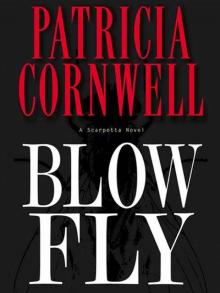 Blow Fly
Blow Fly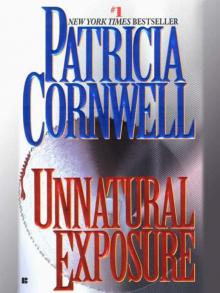 Unnatural Exposure
Unnatural Exposure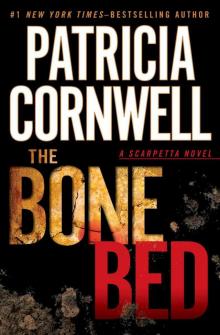 The Bone Bed
The Bone Bed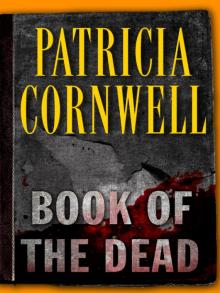 Book of the Dead
Book of the Dead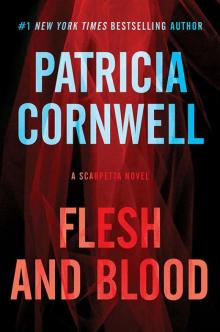 Flesh and Blood: A Scarpetta Novel (Scarpetta Novels Book 22)
Flesh and Blood: A Scarpetta Novel (Scarpetta Novels Book 22)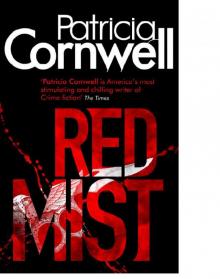 Red Mist
Red Mist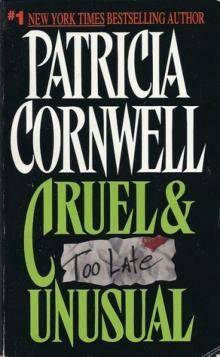 Cruel & Unusual
Cruel & Unusual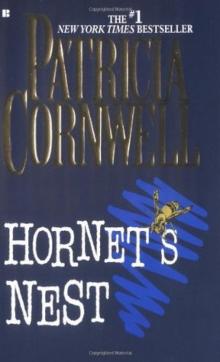 Hornet's Nest
Hornet's Nest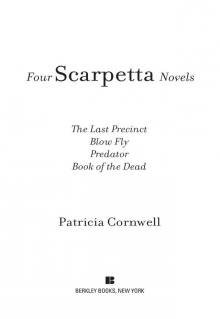 Four Scarpetta Novels
Four Scarpetta Novels Scarpetta's Winter Table
Scarpetta's Winter Table Isle of Dogs
Isle of Dogs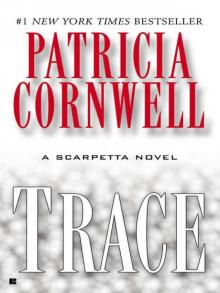 Trace
Trace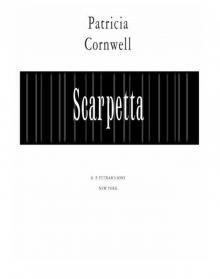 Postmortem
Postmortem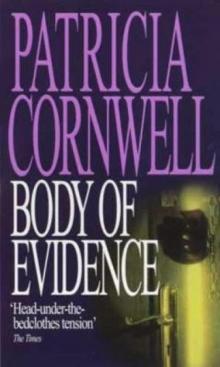 Body of Evidence ks-2
Body of Evidence ks-2 Southern Cross
Southern Cross All That Remains
All That Remains Point of Origin
Point of Origin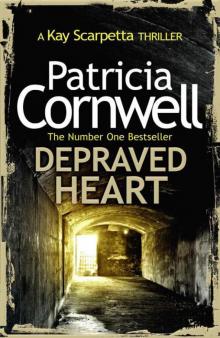 Depraved Heart
Depraved Heart Ruth, a Portrait: The Story of Ruth Bell Graham
Ruth, a Portrait: The Story of Ruth Bell Graham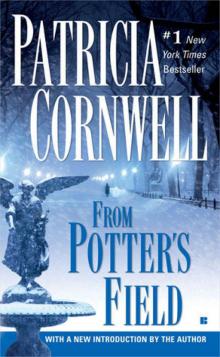 From Potter's Field
From Potter's Field Flesh and Blood
Flesh and Blood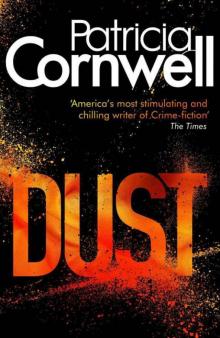 Dust
Dust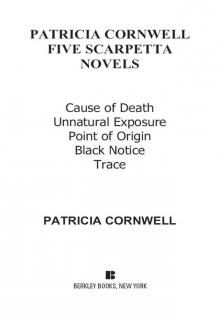 The Body Farm
The Body Farm Port Mortuary
Port Mortuary Quantum
Quantum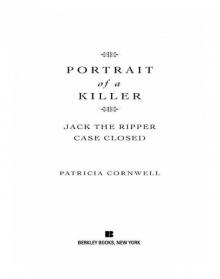 Portrait of a Killer: Jack the Ripper - Case Closed
Portrait of a Killer: Jack the Ripper - Case Closed Spin (Captain Chase)
Spin (Captain Chase)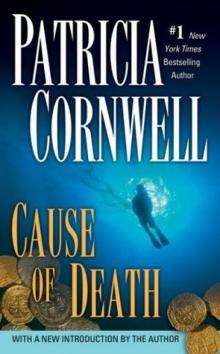 Cause of Death
Cause of Death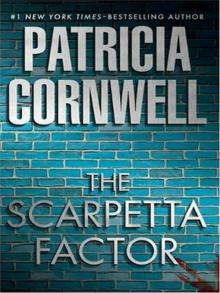 The Scarpetta Factor
The Scarpetta Factor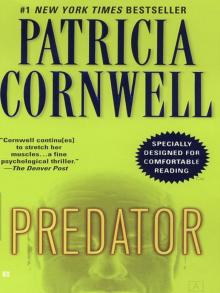 Predator
Predator Scarpetta 18 - Port Mortuary
Scarpetta 18 - Port Mortuary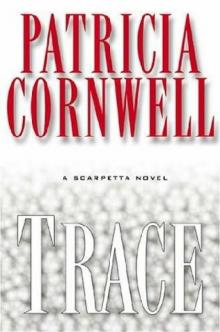 Trace ks-13
Trace ks-13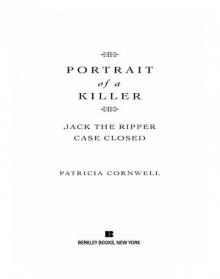 Portrait of a Killer
Portrait of a Killer Cruel and Unusual ks-4
Cruel and Unusual ks-4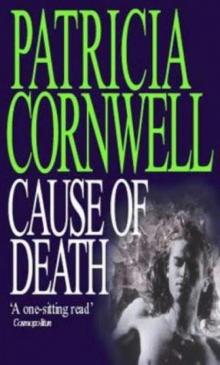 Cause Of Death ks-7
Cause Of Death ks-7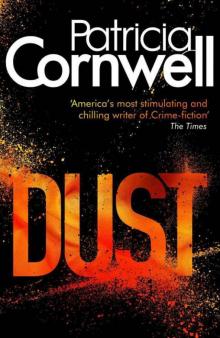 Dust ks-21
Dust ks-21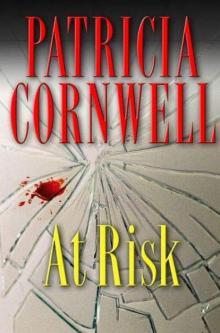 At Risk wg-1
At Risk wg-1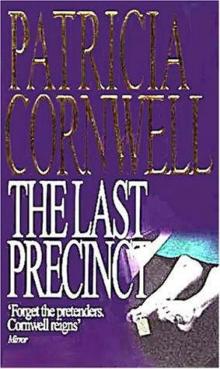 The Last Precinct ks-11
The Last Precinct ks-11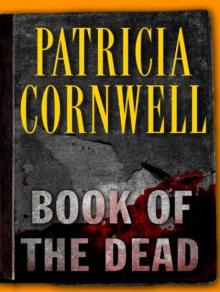 Book of the Dead ks-15
Book of the Dead ks-15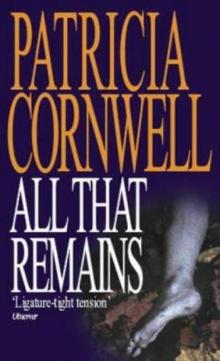 All That Remains ks-3
All That Remains ks-3 Ruth, a Portrait
Ruth, a Portrait Scarpetta's Winter Table (kay scarpetta)
Scarpetta's Winter Table (kay scarpetta)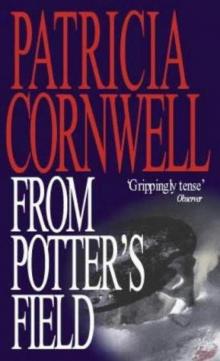 From Potter's Field ks-6
From Potter's Field ks-6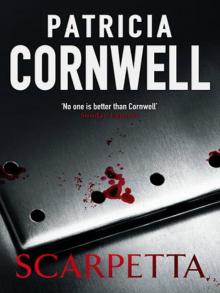 Scarpetta
Scarpetta Isle of Dogs jhabavw-3
Isle of Dogs jhabavw-3 Hornet's Nest jhabavw-1
Hornet's Nest jhabavw-1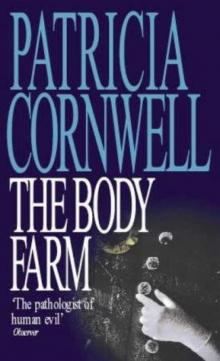 The Body Farm ks-5
The Body Farm ks-5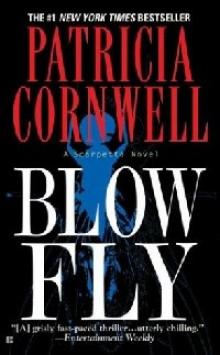 Blow Fly ks-12
Blow Fly ks-12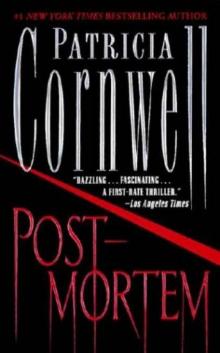 Post Mortem
Post Mortem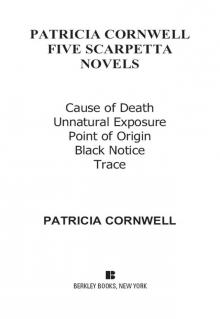 Five Scarpetta Novels
Five Scarpetta Novels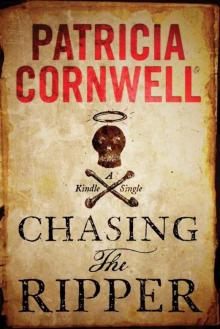 Chasing the Ripper (Kindle Single)
Chasing the Ripper (Kindle Single) Point of Origin ks-9
Point of Origin ks-9 Port Mortuary (2010)
Port Mortuary (2010) Unnatural Exposure ks-8
Unnatural Exposure ks-8 Southern Cross uhabavw-2
Southern Cross uhabavw-2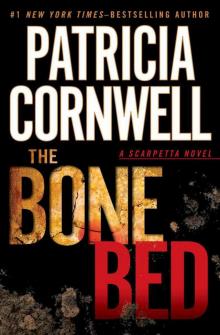 The Bone Bed ks-20
The Bone Bed ks-20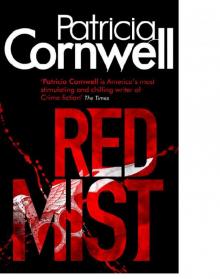 Red Mist ks-19
Red Mist ks-19 Port Mortuary (2010) ks-18
Port Mortuary (2010) ks-18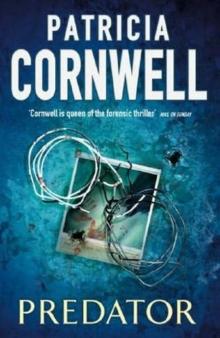 Predator ks-14
Predator ks-14